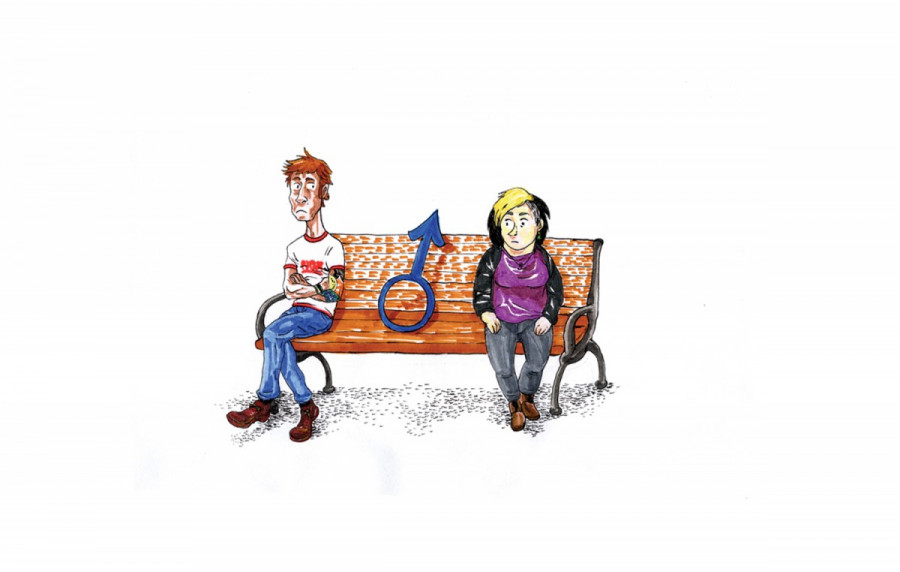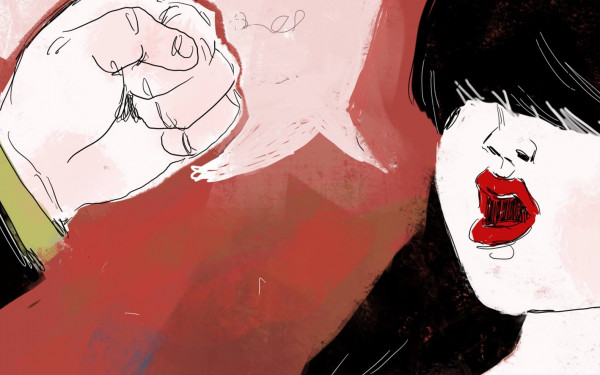Too Quick to Condemn
A Response to “Turning the Male Gaze Inward”
In response to Seila Rizvic’s recent opinion piece “Turning the Male Gaze Inward: Where do Men Fit into the Discussions of Gender?” [Vol. 34, Iss. 7], I would like to address certain issues.
Rizvic is completely right in saying that men’s gender has a place in academic study, and that the advocacy towards men’s issues does not go against any of feminism’s current struggles.
The scholarship being done by our professors sounds fascinating as well; I’m all too curious about how hormone levels affect consumer habits. Rizvic’s puzzled response to the phenomena of men’s rights seems to have missed the point though.
Rizvic is quick to say that it is “jarring” for men to face the reality of gender issues without being defensive. The irony is that some feminists display the same defensive knee jerk reaction to men’s issues.
If one were to mention that suicide rates among men can be three to six times higher than among women (especially with middle aged and divorced men) or that male enrolment in university is dropping (Concordia has avoided this with a stunning 1:1 ratio, but it’s a growing problem in the U.S.), most feminists’ knee jerk reaction is to give a counter list of female grievances, as Rizvic did.
This seems to say that men’s grievances are somehow less important and therefore not worth any attention. As Rizvic mentions, these things do not go against feminist goals, so it is puzzling to men why they cannot be openly discussed on campus without causing an uproar.
Michael Bolen, news editor at Huffington Post Canada, attended September’s men’s rights conference at the University of Toronto Rizvic mentions in her article. The conference was held by The Canadian Association for Equality and members of A Voice for Men, the latter of which is a group Rizvic so adamantly denounced as a “hate group” and “a fringe movement fuelled by misogynistic online rants.”
As he wrote in an article for the Post this month, Bolen approached the conference saying, “I didn’t want to agree with anything the men’s rights movement had to say.” He left saying, “None seemed hostile toward women. They just seemed like they wanted someone to talk to.”
The conference addressed issues like male suicide rates as well as things like shared custody of children, unhealthy perceptions of masculinity and spousal abuse (something that is very taboo if men are the victims). These things do not seem terribly “misogynistic” or hateful.
Over the past year, several similar conferences have led to clashes with campus feminists. The fact that some “feminists” disrupted the conference, calling attendants rape apologists, pigs, fascists and other bigoted slurs, would appear to be the larger obstacle preventing men from speaking up for themselves, or the reason they may radicalize into different forms of Internet activism, some indeed bigoted.
If you look at how little respect this harmless conference was given, as well as the fact that the Univeristy of Toronto’s student union wanted to ban the entire group, can you really blame some men—and women—for adopting a more radical position and being hostile to feminism?
The demonstration against the conference at the University of Toronto can easily be watched on YouTube, and one can make up their own mind as to which side most appears to be a hate group.
The screams of “Shut the fuck up” and “You are misogynists” silence what appears to have been a reasonable attempt for debate on the part of the conference attendants.
It is also hard to understand the reaction of the University of Toronto’s student union. According to Robyn Urback’s piece in The National Post in late May, the student union attempted to not only ban men’s rights groups from speaking on campus but also tried to block its websites from campus servers.
The actions of the student union were sparked by a speech on the effects of video games on boys’ development, and the perils of being a male schoolteacher. Perhaps the protesters at the university were not the extremist fringe group they appear to be, as even the elected student government shares some of the same views.
Rizvic has constructed a straw man of the men’s rights movement, a movement that I respect without necessarily endorsing all of their views. I could say that all feminist bloggers are of the ilk of radical feminist Valerie Solanas. It would be extremely easy to find a few such men-hating bigots through the cesspits of the Internet, or even legitimate feminist portals, but it would be a blatant misrepresentation of the feminist community to only look at its most extreme individuals.
Rizvic, who I believe had the best of intentions, was overly dismissive of an entire group, categorizing them as misogynist online ranters. The rest of her piece was enlightened and progressive, and her point about gender equality not being a zero-sum game is exemplary and cannot be stressed enough.
Our campus needs to be a safe place for discussion, but contrary to what Rizvic believes, it is not only the men of our campus who need to carefully consider how they participate in gender issues.
Everyone is responsible, and misrepresenting one’s views—even if it is done unintentionally—radicalizes both sides. Keeping our university a safe place for discussion includes denouncing and avoiding the idea of mob feminism that surfaced at U of T, which aims to achieve its goals through intimidation and censorship.
We are better than this and I think real feminists are better than it too.


_600_832_s.png)


2_600_375_90_s_c1.jpg)

